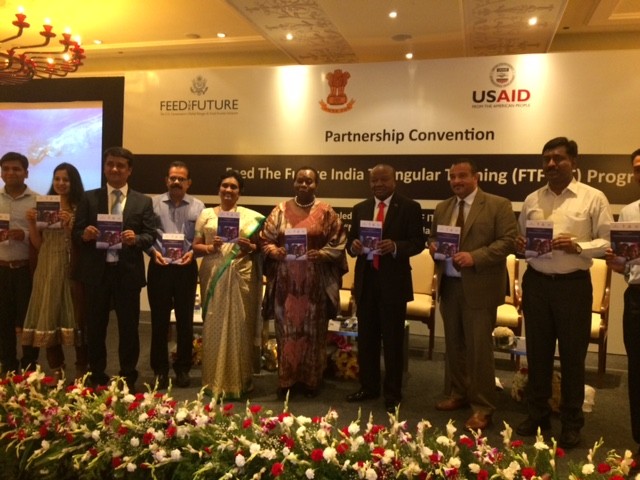India
- History
- Our Work
- Transforming Development Through Innovation & Partnership
- U.S.-India Triangular Cooperation
- Partnership for Energy Access and Security
- Partnership for Sustainable Forests in India
- Partnerships for Health
- Partnership for Education
- Partnership for Water Sanitation and Hygiene (WASH)
- Partnership for Food Security
- Partnership for Gender Equality
- Investing in Afghanistan
- Foreign Assistance Data
- Newsroom
- Newsletters and Fact Sheets
- Speeches
- Resources For Implementing Partners (RFIP)
- Careers
- Partnership Opportunities
- Success Stories
Speeches Shim

(As prepared for delivery)
Good afternoon, Namaskar, Salam Aleekum
I am very happy to be here this afternoon at the valedictory function of the Feed the Future India Triangular Training Program on “Modern Poultry Management”.
Over the past 67 years, India and United States have shared a mutually rewarding relationship. USAID has been working in partnership with the Government of India to test, develop, and deploy innovative and transformative technologies to address critical problems of food production. These technologies and approaches have helped India to achieve self-sufficiency in food production.
U.S.-India partnership has also laid foundation for a strong agricultural research and education system in India. From 1952 to 1972, the six land-grant universities of Illinois, Kansas State, Missouri, Ohio State, Pennsylvania State, and Tennessee entered into agreements to assist the Government of India in developing eight agricultural universities in India. During the 20 years of cooperation, 337 U.S. faculty members were assigned to posts in India and more than 1,000 Indian students received M.Sc. and/or Ph.D. degrees from these same U.S. universities.
The establishment of these initial eight universities laid the foundation for the present 50 agricultural universities, 102 Indian Council of Agricultural Research institutes, and 668 Krishi Vigyan Kendra’s making it one of the world’s largest agricultural systems.
In recent years, our partnership with India has transformed dramatically. India has risen to become both a leading global power as well as an important partner of the United States. The USAID-India relationship has shifted from a traditional donor- recipient relationship to a peer-to peer partnership for addressing Indian and global challenges. Through this partnership, we started to work together in a triangular mode of cooperation to transfer effective agricultural innovations to other developing countries. The U.S. Governments’ global hunger and food security initiative Feed the Future, is a major initiative in this direction. This triangular training program is part of this initiative.
This training program aims to impart knowledge and skills to agricultural professionals from the select countries in Africa and Asia, about the technologies and approaches that helped India to deal with its food security challenges.
I am happy to note that 622 agricultural professionals have completed their trainings and went back to their respective countries to apply their training knowledge. These trainings are creating a critical mass of trained professionals in each of the target countries, which could be leveraged for transforming agricultural context.
Honorable High Commissioners from Kenya and Malawi might appreciate the fact that 64 trainees each from Kenya and Malawi were already trained on various agricultural topics. Several more would be trained in the remaining training programs.
Indian poultry sector has made tremendous progress in the past few decades. Currently India is the third-largest egg producer in the world after China and the U.S. and the fourth-largest chicken producer in the world after China, Brazil and the U.S.
In India, the per capita consumption of eggs has gone up from 30 eggs per annum to 68 eggs per annum, and that of chicken from 400 gms per annum, to 2.5 kg per annum in the last 5 years.
This is all made possible due to modern poultry management practices. Lessons from Indian poultry industry could be directly applied to transform poultry sectors in the developing countries.
Hope you gained useful lessons from here, which you could apply in your respective countries to contribute to agricultural development and farmers’ welfare.
All the efforts -- by the trainees to travel this far, stay away from families; by the faculty in putting together and delivering a great training program; by the organizers in ensuring proper facilities for the training; -- would be worthwhile; only if you go back to your countries and put into use your new learnings from the training.
I am aware that you all prepared back-at-work plans. I wish you success for implementing those plans. Please share your progress in implementing these work plans with MANAGE. If you are successful we would be able to highlight those successes…if you face challenges, your feedback would help us to devise appropriate strategies.
Finally, I thank MANAGE and Directorate of Poultry Research for putting together this useful training, and for inviting me to this valedictory function.
Thank you very much.
Related Speeches
- Deputy Administrator Glick's Remarks at the AJC Virtual Summit on U.S.-India-Israel Relations
- Remarks by Acting Mission Director Ramona El Hamzaoui at the Workshop on Regional Cooperation for Modernization of Power Distribution in South Asia
- Remarks by Acting Mission Director Ramona El Hamzaoui at the Antimicrobial Resistance Summit: One World, One Health, One Fight

Comment
Make a general inquiry or suggest an improvement.